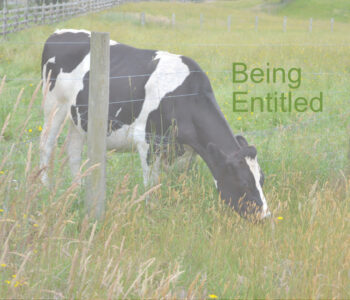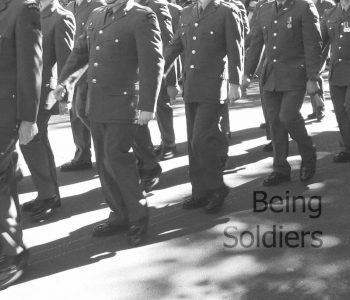 Being...
Being...
Being a Fool
It is clear that in terms of the expectations and values of this world, we are utter fools. We believe in One who cannot even be seen, for a start! Most of us don’t suffer foolishness or fools easily, and yet our message is undoubtedly one of foolishness to this world… (1 Cor. 1:18,27). So we probably need to get used to being thought of as fools!
God deliberately chooses what in this world is insignificant and treated with contempt (1 Cor. 1:28). His is truly a back-to-front Kingdom which so often makes no sense from our human, earthly perspective. One example of this is to give up all our “wisdom” and to be fools: “Stop deceiving yourselves. If you think you are wise by this world’s standards, you need to become a fool to be truly wise” (1 Cor. 3:18).
Another example of this “foolishness” is to be a servant. We aren’t really familiar with what being a servant means in our Western society today. We live in a culture where being strongly individual, working for yourself and standing up for yourself is admired and encouraged. However, being a servant is the opposite of that, and being a servant is something that is frequently mentioned in the Bible.
Today we are more familiar with being called “workers” or “employees” and while there are some similarities between servants and workers, the essential difference has to be in the attitude of the heart. As workers we may work for someone, and yet not serve them. There is something in us naturally that does not like to be subservient and yet we’re called to be servants – not only to God, but to one another also: “Anyone wanting to be the greatest must be the least – the servant of all!” (Mark 9:35).
Some of the characteristics of good servants, even within the last century were:
- Working silently.
- Not giving an opinion.
- Working behind the scenes and usually not seen.
- Never arguing with their master.
- Putting the desires of their master before their own.
- Never talking back or being abusive in their language.
- Knowing their position and place.
- Appreciating the work.
- Loyalty to their master and their master’s family.
- Laying down their personal life, family, and time for the master.
- Being dependent on their master for food, accommodation and a living.
Many of these characteristics are also applicable to us in our spiritual and practical every day lives as we serve our Master.
A servant is humble, thoughtful, and always looking to please their master. They do not take over the role of “master” with their fellow servants; that would be unthinkable, for they recognize that we have only one Master/Lord. “A servant of the Lord must not quarrel but must be kind to everyone, be able to teach, and be patient with difficult people. Gently instruct those who oppose the truth. Perhaps God will change those people’s hearts, and they will learn the truth” (2 Tim. 2:24,25).
While we are the friends and family of God, we are also His servants; all three forms of imagery are true and each reveal certain characteristics:
- as His friends we spend a lot of time with Him and enjoy doing things together;
- as His family we are intimately connected with Him;
- as His servants we willingly and gladly submit ourselves to Him and serve Him, even to the extent of being fools for Him.
Father has been showing me this in a rather unusual way. He is all about redeeming things, even bad things. In this case a couple of years ago a friend referred to me as a “complete ass” and in my friend’s defence, this is quite true and is actually a compliment because, of course, an ass was the only animal in the Bible that God actually spoke through! 🙂
Attributes of Donkeys
A donkey is a more common word for an ass these days, unless you are being crude and offensive and meaning someone who is a fool. Father showed me that I am, indeed, a donkey (this may not be news to some of my friends!) and yes, He even sometimes speaks through me too!
As is usually the case when Father is teaching me about something, I started to see things about donkeys everywhere I looked, including people all around the world getting very excited about a children’s book from New Zealand called, “The Wonky Donkey”, and even a friend who named her own vehicle “Donkey”!
The first thing that usually comes to mind when we think of a donkey, is that they are stubborn, stupid animals. However, I learned that it is due to their situational awareness and intellect that they are often incorrectly labelled as being stubborn:
“Donkeys have a notorious reputation for stubbornness, but this has been attributed to a much stronger sense of self-preservation than exhibited by horses. Likely based on a stronger prey instinct and a weaker connection with humans, it is considerably more difficult to force or frighten a donkey into doing something it perceives to be dangerous for whatever reason. Once a person has earned their confidence they can be willing and companionable partners and very dependable in work. Although formal studies of their behaviour and cognition are rather limited, donkeys appear to be quite intelligent, cautious, friendly, playful, and eager to learn.”
In Grecian fables donkeys were portrayed as being not only stubborn, but also stupid and very lower class, often contrasted with horses. “Aesop alone wrote around twenty fables about ‘donkeys’ and they are invariably depicted in a negative light, as servile and lazy, selfish and stupid; used as examples of human folly and weakness… it is largely from such fables that the donkey’s reputation for foolishness and stupidity has been encouraged and perpetuated.” https://www.ncbi.nlm.nih.gov/pmc/articles/PMC4552212/
In the sixteenth century Shakespeare made using the word “ass” popular as an insult: “It was Shakespeare especially who encouraged the derogatory use of ‘ass’: used frequently in his plays to describe stupid or clownish figures. This commonly used insult denoted an ignorant fellow, a perverse fool or a conceited dolt.”
In sharp contrast to all this, donkeys in the Bible are symbolic of peace, service, suffering, loyalty, patience and humility. Donkeys have been used as a working animal for at least 5000 years. They are known as a “beast of burden” because they carry burdens for other people. They are mentioned 133 times in the Bible, they were the tractor, truck, and car of the day – donkeys were used for getting goods and people from one point to another, as well as being used for milling flour, agricultural, and building work.
“In the Ancient World, donkeys were the ubiquitous beast of burden and were vital to the economy. They carried crops and produce, hauled rock and timber, carried provisions and merchandise, transported food and equipment for the army and turned the heavy millstones to produce flour. The great physical strength and endurance of donkeys while requiring little care and food rendered them primary beasts of burden.” https://www.ncbi.nlm.nih.gov/pmc/articles/PMC4552212/
In both Hebrew and English we have a saying: to work like a donkey. This means to do hard work or less interesting work that has to be done; in other words: a servant’s work! Today we know that donkeys are not only strong, they are smart, and while they form very strong bonds with their owners and family, they are very cautious of strangers.
When a horse is frightened by something they will usually rear up and then bolt, but when a donkey is scared they will freeze and then intelligently investigate and assess the situation before proceeding to do anything. They think about their choices before deciding what action to take and this is often misinterpreted by people as stubbornness, because they aren’t doing what the human wants them to do. This has given donkeys the reputation of being stubborn even though donkeys are usually very obedient. If they weren’t obedient animals they would not have been successfully used by humans for thousands of years!
Some of us need to learn from donkeys how to be “stubborn” in the same way that they are: to refuse to compromise and do what others want us to, and instead be discerning and unmoving until our Master moves with us. “I am not trying to please people. I want to please God. Do you think I am trying to please people? If I were doing that, I would not be a servant of Christ” (Gal. 1:10).
Of course the evidence of this attribute of caution in a donkey in the Bible is most clearly seen in the story of Balaam in Numbers 22-24.
The Story of an Unprophetable Donkey
Balaam was a foreteller with a reputation for the things he’d predicted happening, and so he was sought out by Balak, the king of Moab, to curse his enemies for him. The king sent his ambassadors to Balaam with a fee to pay for his trouble, but there was one big problem: the people the king wanted cursed were God’s own people, the Israelites!
You’d think this would have received an immediate “No can do” reaction from Balaam if he was truly God’s prophet! But instead he invited the officials to stay the night and said, “I’ll deliver the answer that God gives me in the morning.”
Not surprisingly, God said to Balaam: “Don’t go with them. And don’t curse the Israelites—they are a blessed people.” So the next day Balaam sent the important officials packing, as he arguably should have done the previous day instead of entertaining them! The king wasn’t impressed and sent even more important men, princes this time, telling them to say, “I will honour and reward you lavishly—anything you tell me to do, I’ll do; I’ll pay anything!”
This time Balaam replied, “Even if Balak gave me his house stuffed with silver and gold, I wouldn’t be able to defy the orders of my God to do anything, whether big or little. But come along and stay with me tonight as the others did; I’ll see what God will say to me this time.” That sounded really good, but should he have entertained them at all? Should he have given their request any time of day when God had already spoken to him about this? It seems that he was tempted by the offer after all, otherwise he would have immediately dismissed them instead of saying he would ask God again, even though God had already given Balaam His answer.
This time though, God told Balaam to go with them, and it wasn’t because God was in agreement with his mission either; He had something else in mind! So Balaam saddled his donkey and headed off with the princes.
The Bible tells us that God was then angry because Balaam went with them. Sometimes, it seems, if we ignore what God tells us at first, it will appear as though He has changed His mind when He tells us what we want to hear, even when it is NOT His desire for us at all. A servant ought to do what their master tells them to immediately, the first time. And how could Balaam even think that God would want him to go and curse His people in the first place? It looks as though there was something fundamentally wrong with Balaam to begin with. This appears to have been a test for Balaam, a test which he failed.
God took this pretty seriously and sent an angel to kill Balaam while on his journey. Balaam was riding his donkey when the donkey saw the angel on the road in front of them and turned into a field to avoid it. Balaam was probably rather embarrassed by this and beat his donkey until the donkey was back on track again. But they hadn’t gone far when the angel again stood in their way with sword drawn. The donkey veered away, this time crushing Balaam’s foot against a wall. Balaam got angry at his donkey and whipped it.
Now, if Balaam had been riding a horse at this point, I suspect he would no longer have been on the horse to be able to whip it, he would instead have been dumped unceremoniously on the ground after the horse reared in fright and ran off! People have been badly hurt and even killed in falls off horses, but to my knowledge, people don’t get injured in falls from donkeys.
After another beating of the donkey Balaam headed off again, only to be blocked by the angel on the road, this time in a narrow spot where there was nowhere for the donkey to turn, so the donkey simply stopped dead in its tracks and fell to the ground.
This time Balaam totally lost his temper. It must have been very embarrassing to have these things happening in full view of the princes and his servants! He beat the donkey with a stick. At this point God enabled the donkey to talk. She said, “What have I done to you that you’ve beaten me three times?”
And, instead of stopping and realising that something very strange and supernatural was happening here, Balaam actually answered the donkey! He must have been pretty riled up not to realise that it was not normal for his donkey to talk back to him! Balaam said to his donkey, “You’ve provoked me and made me look like a fool! If I had a sword I would have killed you by now.”
The donkey spoke again to Balaam: “Am I not your trusty donkey on whom you’ve ridden for years right up until now? Have I ever done anything like this to you before? Have I?”
He admitted that no, she had not. Then God enabled him to see the angel blocking the way and it was Balaam that fell to the ground this time! The angel said to him, “Why have you beaten your poor donkey these three times? I have come here to block your way because you’re getting way ahead of yourself, your behavior is willfully contrary. The donkey saw me and turned away from me these three times. If she hadn’t, I would have killed you by this time, but not the donkey. I would have let her off.”
So, the donkey had saved his life three times. Balaam repented and said he’d go home, but God told him to go on ahead, but only to speak the words He gave. And the words He gave Balaam to say were words of blessing over His people! The king was none too happy with this and got Balaam to try to curse them three times.
Interestingly, the final time, the Bible says: “Balaam realized that God wanted to bless Israel. So he didn’t work in any sorcery or divination as he had done earlier.” Wow! This was a compromising prophet if ever there was one, and yet, sadly, he would be welcomed in many churches today, simply because of his foretelling ability and because he had heard God’s voice. Today people would likely think he was a true prophet of God and listen to the man!
Finally King Balak lost his temper with Balaam and they both went their separate ways. In Joshua 13:22 Balaam is recorded as a soothsayer/diviner/false prophet and it states that he was killed by the people of Israel. In 2 Peter 2 he is referred to as “a profiteer and connoisseur of evil” and Jude warns of being sucked into Balaam’s error by greed.
Peter sums it up with: “Balaam… fell in love with the money he could make by doing wrong; but Balaam was stopped from his mad course when his donkey spoke to him with a human voice, scolding and rebuking him” (2 Pet. 2:15,16).
Learning to be a Servant
If God wanted to kill Balaam, and sent His angel to do this, then why did He allow a humble donkey to stop Him? It looks like a case of redemption yet again: God turned the cursing the king had wanted to give, into the blessing of His people. Interestingly, in the Jewish religion the donkey is considered an impure animal, even more impure than a pig because it not only has non-split hooves, but also does not chew the cud – the two prerequisites for “kosher” animals. And yet, in spite of that double impurity, it is the only impure animal whose firstborn could be consecrated and redeemed (Ex. 13:13; 34:20). The Talmud suggests that there is something special about the donkey, that it represents the redemption of the Jewish people because the donkey was chosen by them to carry the gold and silver when they escaped from Egypt.
The fact is that God often seems to speak to us through someone or something that would deliberately offend us and that is not “kosher” – whether because of impurity, immaturity or even stupidity. I think He wants us to get over ourselves and to see the truth about ourselves and He often uses offence to accomplish this! After all, it is hard to offend a humble person, and impossible to offend a dead person.
A donkey is not nearly as impressive or as big as a horse, and yet Jesus chose to ride into Jerusalem, not on an impressive, stately white stallion, but on a small, humble, grey donkey. As He so often did, He chose the opposite of what we would choose! Jesus chose to honour this creature who was normally considered so very impure; He was, and still is, all about redemption, restitution, reparation and reclamation! Each of us are living examples of this fact. And each of us also carries Christ where He wants to go; just like this donkey did. Every donkey also bears the sign of a cross physically on its back, and so do we spiritually – we are marked as Christ’s ones who take up our cross every day (Luke 9:23).
There’s no doubt that a donkey epitomises a servant. While many of us may be workers, not all of us are servants. Workers will get a job done, but a servant is invested with their whole life in loyalty, selflessness and service.
And just in case there is any misunderstanding, by service and serving I am not thinking of or talking about “ministries”, or anything to do with a church. I am talking about being devoted to one Master and serving that Master loyally and faithfully no matter what the cost. The closest example I can think of in my own world, is a dedicated mother who loves and serves her children, husband and household day in and day out without monetary recompense. Each of us can work for either God or ourselves in our workplace, whether that be at home, or outside the home – it is primarily a heart issue, and not a physical issue. Many of those who think they are God’s servants are very busy going and doing and saying things that He has never asked them to – just like Balaam, and that is NOT being a servant at all. That is serving yourself, your ambition, your “mission”, your vision, your church, and your own desires.
“It is almost unbelievable how far we will go to avoid obeying God. We call Jesus “Lord” and beg Him to rejuvenate our souls, but we are careful to do not the things He says. When faced with a sin, a confession or a moral alteration in our life, we find it much easier to pray half a night than to obey God. Intensity of prayer is no criterion of its effectiveness. A man may throw himself on his face and sob out his troubles to the Lord and yet have no intention to obey the commandments of Christ. Strong emotion and tears may be no more than the outcropping of a vexed spirit, evidence of stubborn resistance to God’s known will.” – A. W. Tozer, Sacrifice is No Substitute for Obedience
Serving other people is not necessarily serving God at all; it can be, but isn’t always. Too many people deceive themselves in this area. Remember that even though Balaam had heard God speak to him and was sought out because of this, he abused not only his “gifting” but also his donkey, his faithful working animal/servant. We see this a lot in churches and “ministries” where a leader will use people he/she considers lower than themselves, essentially riding on top of others, and beating them with words to get them to do what they want; and it is not a good thing. It is the way of Balaam whose name means “not of the people; a foreigner”.
Jesus mentioned Balaam in a warning to His people in the book of the Revelation: “I have a few complaints against you. Some of you are following the teaching of Balaam. Long ago he told Balak to teach the people of Israel to eat food that had been offered to idols and to be immoral” (Rev 2:14). Balaam had revealed to Balak how to deceive and trip up God’s people – through compromise.
“In other words, more simply, it amounted to this: there are those there who introduce worldly methods, worldly means and resources, worldly policy into the realm of the things of God and among the people of God. Every one of us is assailed far more subtly than we recognise in this very thing. It is not just a matter of introducing the grosser forms of worldliness, but it is sometimes just a little bit of worldly wisdom, for example, in making decisions, where the thing is not wholly of the Holy Spirit and we use man’s standards of values and judgment; where we are sometimes tempted to take a line of less resistance in order to gain some advantage; where we come down from the high place of trusting the Lord for everything in a day of pressure, adversity or trial and do not hold on to the Lord to meet the situation. Instead we are tempted to turn to some expedient way of meeting the situation… expediency, to a little bit of human diplomacy, patronage, stirring of the flesh in order to get through. All that is the spirit of the world and it works in very subtle ways from time to time, and when it has dictated a course or governed a decision, there has come about a state of compromise where the Holy Spirit Himself has to stand back in helplessness and leave us to get on with it and we find ourselves in a state of terrible bondage and spiritual weakness.” T. Austin-Sparks, The Recovery of Spiritual Power Chapter 5.
If God asked you to give up all that you’re doing, give up all your “spiritual” religious activities and simply be alone with Him for even a couple of months, seemingly doing nothing, would you do it? Too often the church, religion, “ministry” and activities associated with churches and religion are the master of people’s hearts instead of Christ Himself. As I’ve said elsewhere, this is idolatry and when these things are an idol, you cannot hear or see Christ clearly because your idol is very effectively blocking your vision and your hearing, just as the Bible tells us (see Psalm 135:15-18).
The Hebrew word for “serve” means to labour and work. So when we say we are serving God we are saying that we are working for HIM; we are not working for other people, or for money, or for recognition, or for any of the things this world expects to be related to work. We are, in a sense, fools for giving up all that this world values! This kind of service gives up what you want, gives up your own life, to live for someone else. In fact, this kind of working is intimately linked with love because it is our joy and our privilege to work and live for our Master, it is truly a “labour of love”! And to love, live and work in this way may seem foolish to some. This is a very fierce, stubborn love, a love that will serve nobody else, not even yourself; instead your life, your purpose, your desire, your reason to live is now entirely found in this One!
Think of us as servants of Christ who have been given the work of explaining God’s mysterious ways (1 Cor. 4:1).



















